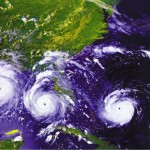BE PREPARED FOR THE PEAK OF HURRICANE SEASON
 Thursday, June 10, 2010 at 09:32AM
Thursday, June 10, 2010 at 09:32AM  Hurricanes in Georgia? Yes! According to the National Oceanic and Atmospheric Administration (NOAA) Georgia is at particular risk of being affected by hurricanes because it is a coastal state. The hurricanes that affect Georgia are severe tropical storms that form in the southern Atlantic Ocean, Caribbean Sea and Gulf of Mexico. Hurricane season lasts from June 1st until November 30th, but the majority of activity is from August until October. Therefore, every state resident and business owner should plan what to do in the event of a hurricane or tropical storm. The following tips can help you keep your business up and running this hurricane season. Please feel free to post them in your office for all of your staff to see.
Hurricanes in Georgia? Yes! According to the National Oceanic and Atmospheric Administration (NOAA) Georgia is at particular risk of being affected by hurricanes because it is a coastal state. The hurricanes that affect Georgia are severe tropical storms that form in the southern Atlantic Ocean, Caribbean Sea and Gulf of Mexico. Hurricane season lasts from June 1st until November 30th, but the majority of activity is from August until October. Therefore, every state resident and business owner should plan what to do in the event of a hurricane or tropical storm. The following tips can help you keep your business up and running this hurricane season. Please feel free to post them in your office for all of your staff to see.
1. Make a Ready Kit. Visit www.ready.gov for a list of emergency supplies you need for your kit.
2. Know your hurricane terms.
- A hurricane watch means a hurricane is possible in your area. Be prepared to evacuate.
- A hurricane warning means a hurricane is expected in your area. If local authorities advise you to evacuate, leave immediately.
3. Be prepared to secure your property.
4. Cover all of your property's windows with pre-cut ply wood or hurricane shutters to protect your windows from high winds.
5. Plan to bring in all outdoor furniture, decorations, garbage cans and anything else that is not tied down.
6. Keep all trees and shrubs well trimmed.
7. Fill the gas tank in your vehicle in case you have to evacuate.
Listen to an NOAA Weather Radio, watch TV, listen to the radio or check the Internet often for official news and instructions as they become available.
HOW CAN YOU STAY SAFE AFTER A HURRICANE?
1. Stay out of flood waters, if possible. The water may be contaminated or electrically charged. However, should you find yourself trapped in your vehicle in rising water get out immediately and seek higher ground.
2. Be alert for tornadoes and flooding. If you see a funnel cloud or if local authorities issue a tornado warning take shelter underground, if possible or in an interior room away from windows. If waters are rising quickly or local authorities issue a flood or flash flood warning, seek higher ground.
3. Stay away from downed power lines to avoid the risk of electric shock or electrocution.
4. Do not return to your property until local authorities say it is safe. Even after the hurricane and after flood waters recede, roads may be weakened and could collapse. Buildings may be unstable, and drinking water may be contaminated. Use common sense and exercise caution.


Reader Comments